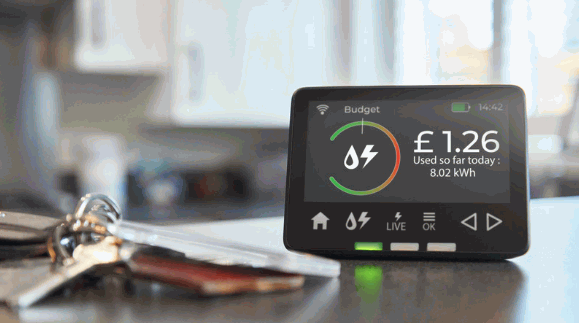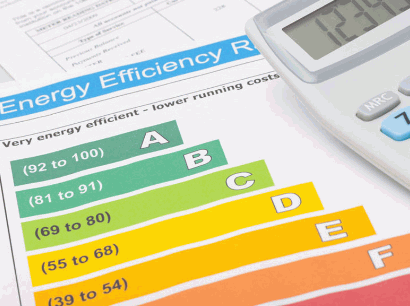
If you're selling or renting a property then you will have come across EPC ratings. These relate to the Energy Performance Certificate, which demonstrates how energy-efficient a property is. The rating can be from A (most efficient) to G (least efficient). Having a low rating means that a property isn't very energy efficient and will have both higher energy bills and carbon dioxide emissions. There are lots of measures you can take to improve your EPC rating. A smart meter may not directly impact your rating but it can help you get a better idea of where you need to improve.
If you need an EPC certificate or you need personalized, tailored advice on how to make your property more energy efficient, the EPC Crew can help. We are experts in EPC and we can help you to understand your rating and what measures you can take to improve it.

Improving your EPC rating can make a big difference to your energy costs, as measures to improve your rating will make your property more energy efficient. An EPC is publically available for every property that has one and it is valid for 10 years after it is issued.
Explore: How To Improve Energy Performance Certificate

If you are looking to sell your property, then a higher EPC rating can increase its market value. EPC ratings are publicly available and any potential buyers will be able to view your property's EPC rating when they are considering it.
Because a higher EPC rating means lower energy bills, many buyers will see it as an attractive option above similar properties with a lower EPC rating.
Discover: Do You Need An EPC Certificate To Sell A House
If you are looking to rent your property, then its EPC rating can be even more important again. As part of the government's push to reduce the country's carbon emissions, there is a minimum energy efficiency standard (MEES) for rental properties. At present, this is an EPC rating of E but the government is planning on raising this to C and then to B within the next decade.
Rental properties legally have to meet this minimum EPC rating to be eligible. If a property has a rating of F or below, then it legally cannot be rented out.
Even if you aren't about to rent out or sell your home, finding out how to improve the EPC rating can be a good idea. A higher EPC will mean that your property is more energy efficient, so you will have lower electricity and heating bills. An EPC certificate will also provide you with clear steps to take to make your home more energy efficient.
An EPC rating is designed to reflect the energy efficiency, energy costs, and carbon footprint of a property.
If you need an EPC certificate, then you can get in touch with a domestic energy assessor to come out and survey your property. This assessment has to be completed by someone qualified by an accredited body and it will cost money. The average price of an EPC assessment is between £35 and £120.
Domestic energy assessors are trained to examine a variety of elements in a property. These are places in the property that will either use a lot of energy or lose a lot of energy. If a property uses less energy or loses less energy (or both) then it will more more energy efficient.
Once they have examined these key elements of the property, they will input the findings into specialized EPC software. This will give the property a score using something called the Standard Assessment Procedure (SAP).
Some elements of a property (e.g. the walls) may not be directly examined by the assessor but they will use information about the age and construction type to estimate the likely energy efficiency of these.
The SAP rating is out of 100 (with 100 being the most efficient and 0 being completely inefficient) and the SAP score directly maps onto the EPC rating of A to G.
As well as the overall SAP score, the EPC certificate will also go into detail about each of the elements that were examined. They are given an individual energy efficiency score out of 5.
There will be a section laying out the carbon footprint of the home and the estimated energy costs of running it (heating and lighting costs only. Appliances are not included). It will provide personalized suggestions for how to improve your home's energy efficiency. Finally, it will show what the predicted energy costs will be if the recommendations are completed.
Check out: How Are Energy Performance Certificates Calculated

The most valuable section in your EPC certificate, if you want to improve your EPC rating, is the recommended improvements. The certificate will lay out specific changes that could be made to improve the property's energy efficiency.
These suggestions will relate directly to the elements of the property that might use a lot of energy or lose a lot of energy. And they will be laid out in order of importance. It will also show what the energy consumption of the property will look like if the changes are made, as well as what the predicted energy costs will be.
Some of the most common methods of improving an energy efficiency rating include:
A combination of these methods will help in reducing energy bills and will also improve your EPC rating. For example, double-glazed windows will reduce heat loss so your heating system will use less energy to heat your home. And installing a more efficient heating system will mean that less energy is needed again.
Your EPC certificate will help you to understand which elements of your home most need updating to improve your EPC rating. Each element's score out of 5 will tell you which parts of your home are most energy-inefficient. For example, if you have single glazing then your certificate will likely give your windows a low score and suggest that you install double glazing. Or if you have an older inefficient boiler, it will give that a low score, and recommend installing a newer model.

Smart meters are becoming increasingly commonplace. The goal is to offer every household in the country a smart meter by the end of 2025.
These types of meters are certainly related to energy efficiency, reducing energy bills, and lowering the carbon footprint of a property but do they have an impact on EPC ratings?
The answer is: not directly. Smart meters aren't taken into account as part of the EPC SAP calculations because they don't directly improve a property's energy efficiency. But let's take a look at how smart meters work and why they could still help you improve your EPC rating.
Smart meters are designed to replace standard meters. With a standard meter, the homeowner or occupier is required to manually take readings to show their energy supplier how much energy they have used.
Smart meters, on the other hand, are designed to take these readings constantly and automatically so that the energy company has real-time information about how much energy you are using.
Every time energy is used, data is sent wirelessly to the energy supplier via the national communication network (DDC). This data is double encrypted and securely wrapped to avoid data breach concerns. The energy supplier will use this exact information to charge you for the amount of energy you use.
This same data is also sent to an in-home display. This is an electronic device that shows the amount of gas and/or electricity being used in near real-time. It also shows how much the energy use will cost.

As we have mentioned, a smart meter isn't part of the EPC rating calculation. But using one could help to improve your property's EPC rating in a more roundabout way.
It is worth remembering that smart meters are not the same thing as heating controls. Heating controls are included in the EPC calculation because using them will directly affect your energy efficiency. For example, a thermostat that monitors the property's temperature will reduce heating costs because it will turn the heating off much sooner than if you were doing it manually.
A smart meter won't reduce your energy use in the same way but what it can do is give you detailed near real-time information about how the different elements of your home use energy. The classic example is the sudden spike in energy use and cost that turning on the kettle will show.
Using a smart meter will help you to see, for example, if your heating system is using a lot more energy than it should and this will help you to make decisions about the most important energy efficiency measures to take before a domestic energy assessor even arrives.
For rental properties and houses being put up for sale, the actual EPC rating is important. But if you are looking into improving your EPC rating because you want to lower your energy bills, then a smart meter can be a good thing to have in its own right.
The EPC rating only looks at the energy costs of heating and lighting. It doesn't take into account the energy costs of the appliances in your home. However, a smart meter does. So it can help to give you a complete picture of where you are using the most energy and extra steps you can take to lower your energy bills.
For example, your property might have a high EPC rating but if you are running an older inefficient dishwasher then your energy bills will still be higher than they should be. A smart meter will show you exactly how much money that appliance costs to run so you can direct your energy efficiency measures more specifically.
Some energy suppliers are also offering lower energy tariffs if you choose to install a smart meter so this could help to lower your energy bills even further.
A smart meter will be more accurate about your energy use. With standard meters, the energy company will be relying on predicted energy use between manual readings. But a smart meter will show exactly how much energy you use so you can be sure that your bills are accurate.

An Energy Performance Certificate (EPC) is valid for 10 years but if you have improved your home's energy efficiency, you can get a new one issued to reflect these changes.
This can be worthwhile if you are preparing to sell your property because it will give potential buyers accurate information about the current energy efficiency of the property.
If you are renting your home and these changes allow you to meet the minimum EPC rating then getting a new certificate will be necessary.
A smart meter won't increase your EPC rating directly. It isn't taken into account when your rating is calculated because it doesn't on its own change your home's energy efficiency. It can help you to get a higher EPC rating, however, because it can give you a much clearer idea of what elements of your home are using the most energy. This will help you to make informed choices about the best energy efficiency measures to take.
If you need an EPC rating or want advice about how to improve your property's EPC rating, then you can get in touch with the EPC Crew. We are experts in EPC and can help you to ensure that your property is as energy efficient as it can be, with an EPC rating that reflects that.